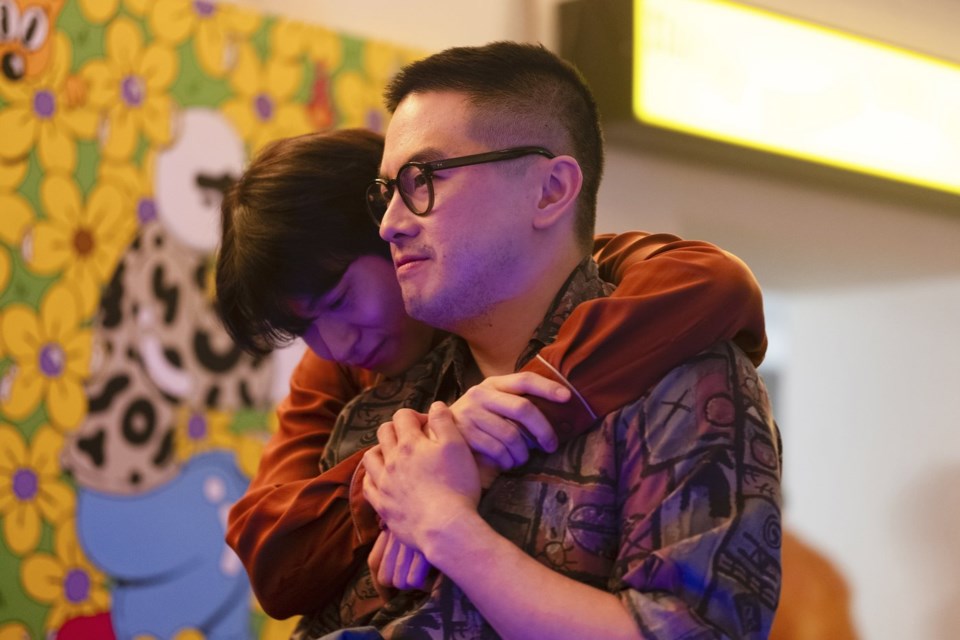Two gay couples decide to embark on one fake straight marriage to get what they need in Andrew Ahn’s modern update of “The Wedding Banquet.”
Min (Han Gi-Chan), a young artist from an extremely wealthy Korean family, wants to stay in the U.S. longer to be with his boyfriend Chris ( Bowen Yang ) and delay his family obligations. Angela ( Kelly Marie Tran ) and Lee ( Lily Gladstone ) need money for another IVF attempt after their second round failed.
In 1993, when Ang Lee released “The Wedding Banquet,” same sex marriage was not legal in the U.S. In a modern-day remake set in and around Seattle, they would need another obstacle preventing Min from marrying his way into a green card. Here, Chris is the holdup. He refuses Min, not wanting to be the thing that gets in the way of his inheritance, but also perhaps because he carries some deep feelings of inadequacy.
So, Min proposes that he marry Angela instead as a short-term fix. He’ll give them money for IVF, and he can hang around and try to work things out with Chris. These couples also happen to share a backyard — Lee owns a home and rents the one room ADU to Chris and Min.
There is a version of this setup that would lend itself to some wacky hijinks as they clumsily embark on this poorly thought-out plan. If you’ve seen the trailer, you’ve probably seen one of the main ones: A panicked “de-gay” the house montage when they discover that Min’s grandmother Ja-Young (Oscar-winner Youn Yuh-jung of “Minari”), is 45 minutes away from an unannounced visit. Perhaps it’s to Ahn and co-writer James Schamus’s credit that these are kept to a minimum. Part of this is due to the fact that Ja-Young is no fool — she knows her grandson and has everyone in full confessional mode in under 15 minutes. This was a wise choice.
And yet, I still wanted it to be more fun, or, rather, I wanted the characters to be having more fun together. There’s a throughline about found families, but I’m not totally convinced that these people are great for each other. Chris and Angela, who we’re told have been unhealthily co-dependent since college, seem to be the dead weight in both relationships as a result of their own traumas and general youthful messiness.
Angela even has the gall to propose to Lee that they should use Min’s money to travel the world instead. This is done in a drunken haze that will result in more bad decisions, but it seems like a rather important conversation to revisit, especially for Lee who has been open about her desire to have a child and who is worried that she doesn't have much time left to do so.
There is so much crying, so much anguish, so many issues left unexamined that it’s hard not to find yourself rooting for everyone (especially Lee and Min) to just cut their losses and find new people. It can be a little tiresome at times watching them agonize over problems that seem surmountable.
The biggest relief comes in the form of the older characters including Ja-Young and Joan Chen as May, Angela’s mother. May is introduced accepting an award from a local LGBTQ+ group for her advocacy work, while Angela seethes in the audience. Her mother, who we later find out didn’t speak to her for a time after she came out, has devoted her life to advocacy on behalf of her gay daughter now, which Angela suspects is done for the spotlight, not the cause.
But Chen, and the script, imbue the scenario with unexpected nuance and wisdom. Likewise, Ja-Young doesn’t fall into any expected cliché trappings of an older Korean woman reconciling with her gay grandson. She’s thoughtful and personal about it, wondering if she made the right decisions about Min’s upbringing years ago. May, too, is trying to atone for her past mistakes, however clunkily. Both women just seem to want the kids to be happy — and their scenes together, though brief, are some of the best in the film.
Yang might be a little out of his depths in some of the more emotional scenes – especially difficult since Tran is a world-class crier. Gladstone also seems woefully underutilized, but perhaps that’s just part of her particular magic even in a solid supporting role.
But you can also excuse a lot in a film that was clearly made with its heart in the right place and a deep love for all its characters, even in their messiest, most unsympathetic moments.
“The Wedding Banquet,” a Bleecker Street release in theaters Friday, is rated R by the Motion Picture Association for “language, some sexual material and nudity.” Running time: 103 minutes. Two and a half stars out of four.
Lindsey Bahr, The Associated Press




